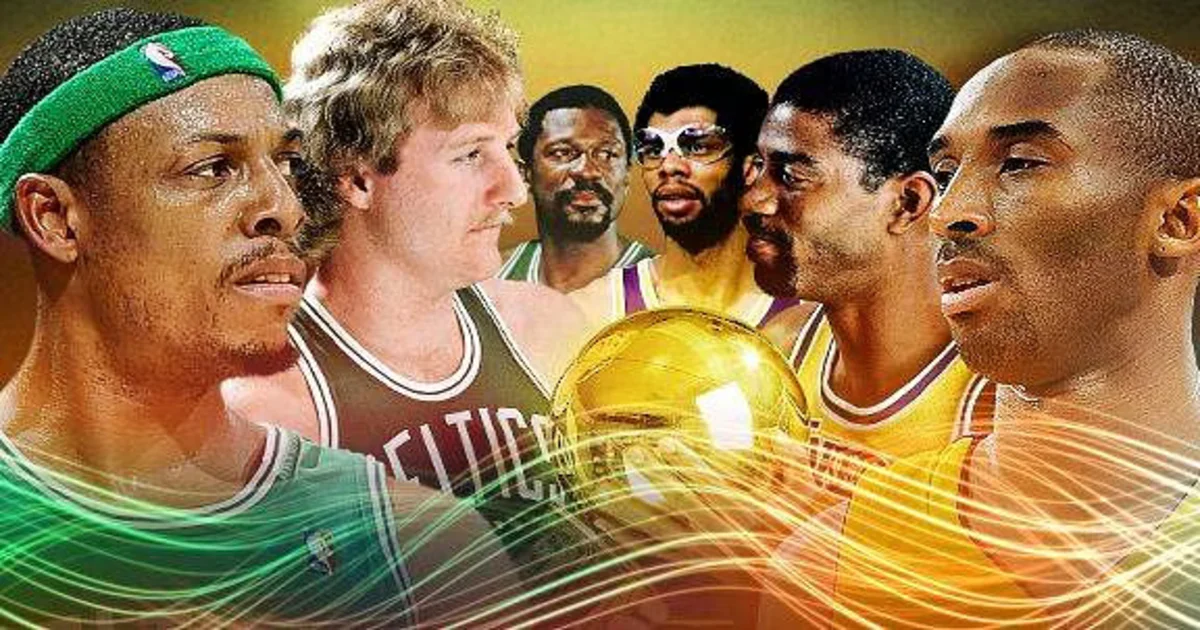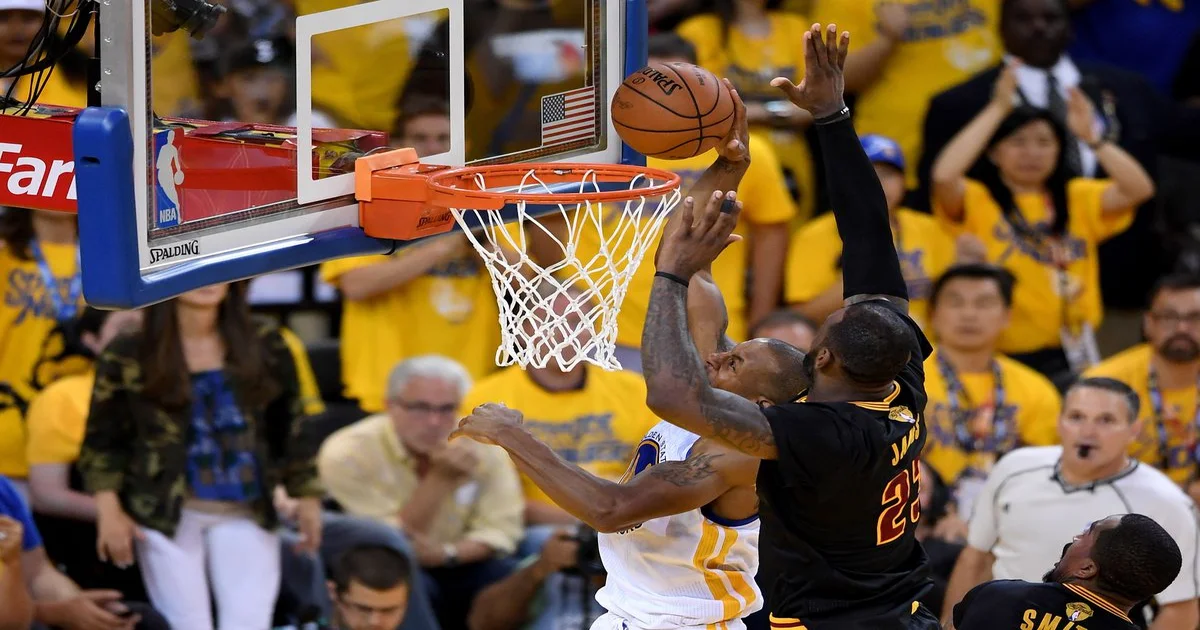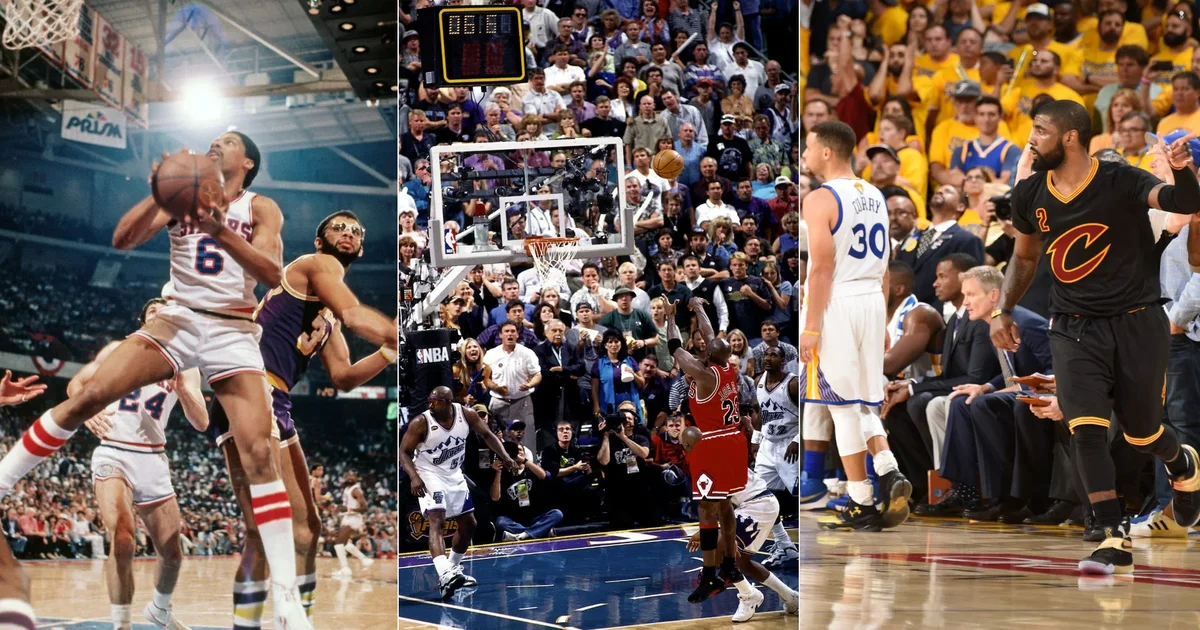Introduction
The NBA Finals is the annual championship series of the National Basketball Association (NBA). The event has been held annually since 1947, and it’s the culmination of a season’s hard work for the two best teams in the league. The series has had a rich history, filled with memorable moments, legendary players, and significant impacts on basketball. It’s a stage where legends are made and dreams are realized or shattered.
Evolution of NBA Finals Formats
The NBA Finals has undergone several format changes since its inception. The initial series followed a best-of-seven format, but this changed in 1950 to a 2-2-1-1-1 format, meaning the team with home-court advantage hosted games 1, 2, 5, and 7, while the other team hosted games 3, 4, and 6. This format was changed in 1985 to a 2-3-2 format, with the team with home-court advantage hosting games 1, 2, 6, and 7. This was done to reduce travel strain on the players. However, in 2014, the league reverted to the 2-2-1-1-1 format, which is still used today. Each change has influenced the competition, affecting strategies and outcomes differently.
Impact of NBA Finals on Player Legacies
The NBA Finals has played a crucial role in shaping player legacies. It’s often said that players are judged by their performances in the Finals. From Michael Jordan’s six titles with the Chicago Bulls to LeBron James’ championships with three different teams, the Finals have often been the defining moments in a player’s career. A great performance in the Finals can elevate a player’s status to legendary, while a poor performance can tarnish an otherwise stellar career. The Finals is where the greats prove their greatness.
Notable Underdog Stories in NBA Finals History
There have been several notable underdog stories in the history of the NBA Finals. These teams were not expected to win but defied the odds to claim the championship. One such story is that of the 2004 Detroit Pistons. Without a bona fide superstar, this team defeated the star-studded Los Angeles Lakers in five games. Another memorable underdog story is that of the 2011 Dallas Mavericks. Led by Dirk Nowitzki, the Mavericks defeated the Miami Heat’s ‘Big Three’ of LeBron James, Dwyane Wade, and Chris Bosh.
NBA Finals Rivalries Through the Decades

Rivalries have always been a significant part of the NBA Finals. These intense battles between teams have added an extra layer of excitement to the Finals. One of the most iconic rivalries in NBA history is between the Boston Celtics and the Los Angeles Lakers. This rivalry began in the 1960s and has continued through the decades, with both teams meeting in the Finals multiple times. More recently, the Golden State Warriors and the Cleveland Cavaliers developed a rivalry, meeting in the Finals for four consecutive years from 2015 to 2018.
Role of NBA Finals in Basketball Culture
The NBA Finals have played a significant role in shaping basketball culture in the United States and worldwide. The Finals has been a platform for players to make social and political statements, influencing fashion, music, and other aspects of popular culture. For example, the “Air Jordan” sneakers became a cultural phenomenon after Michael Jordan wore them during the Finals. Similarly, the “Showtime” Lakers of the 1980s, with their fast-paced and flashy style of play, significantly impacted the basketball culture.
Game 7s in the NBA Finals have always been special. They represent the culmination of a hard-fought series and have often resulted in some of the most memorable moments in NBA history. For instance, the 2016 NBA Finals Game 7, where the Cleveland Cavaliers returned from a 3-1 deficit to win the championship, is considered one of the greatest games in the history of the NBA.
Contribution of Coaches to NBA Finals Success
Coaches have played a crucial role in a team’s success in the NBA Finals. Their strategies, leadership, and ability to motivate players are often the difference between winning and losing. With his triangle offense, Phil Jackson led the Chicago Bulls and the Los Angeles Lakers to multiple championships. Gregg Popovich’s team-first approach with the San Antonio Spurs has also resulted in several titles. These coaches, among others, have left an indelible mark on the NBA Finals.
NBA Finals Turning Points in History
There have been several turning points in the history of the NBA Finals. These moments changed the course of a series and, in some cases, the trajectory of the NBA. Magic Johnson’s “junior sky hook” in the 1987 Finals, Ray Allen’s clutch three-pointer in Game 6 of the 2013 Finals, and LeBron James’ iconic block in Game 7 of the 2016 Finals are just a few examples of such turning points.
The NBA Finals isn’t just about crowning champions; it’s also a stage where the game evolves. Magic Johnson’s “Showtime” Lakers revolutionized pace and ball movement, the Celtics’ defensive juggernauts of the 80s redefined defensive principles, and the Golden State Warriors “small ball” dynasty ushered in a new era of three-point dominance. These Finals moments became turning points, forever altering the landscape of basketball.
There have been numerous turning points in the history of the NBA Finals. These moments changed the course of a series and, in some cases, the trajectory of the NBA. Magic Johnson’s “baby sky hook” in Game 4 of the 1987 NBA Finals, Ray Allen’s clutch three-pointer in Game 6 of the 2013 NBA Finals, and LeBron James’ chase-down block in Game 7 of the 2016 NBA Finals are just a few examples of such turning points.
Pivotal moments have dictated the course of the NBA Finals, setting franchises up for extended glory runs or sending them into ruin:
- In 1984, Boston was heavily favored to beat the Lakers after dispatching them the previous seven Finals matchups throughout the 1960s and ’80s. But Gerald Henderson’s steal and score, followed by Magic Johnson’s baby sky hook to win Game 4, swung momentum as the Lakers eventually took the series, marking a key changing of the guard.
- Michael Jordan’s iconic final shot for his 6th championship in 1998 validated him as the greatest ever and set up the Bulls for a second three-peat. However, his retirement months later dismantled the dynasty as the Bulls crashed into oblivion for years.
- The Lakers looked poised to three-peat when they went up 2-2 over the Pistons in 1989 behind Magic and Kareem. But after Magic was shaken by MVP Isiah Thomas’ ruthless tactics and ankle sprain in Game 7, LA unraveled as Detroit dethroned them for the next two years, too.
- In 2012 and 2016, LeBron James rallied from 3-1 down against the Warriors and 3-1 versus the record-setting 73-win Warriors to transform his legacy. The unprecedented comebacks marked career turning points, elevating LeBron’s stature while dealing blows to a potential Warriors dynasty.
Throughout NBA Finals history, individual games and moments have held disproportionate significance in shaping legacies and eras after the fact.
Influence of NBA Finals on Global Basketball Trends
The NBA Finals has had a significant influence on global basketball trends. The success of international players like Dirk Nowitzki, Manu Ginobili, and Pau Gasol in the Finals has inspired a generation of young players worldwide. The NBA’s global outreach programs, coupled with the broadcast of the Finals in multiple languages, have also contributed to the growth of basketball globally.
The NBA Finals isn’t just an American spectacle; it’s a global phenomenon. The athleticism, the drama, the passion – these elements transcend borders, inspiring young players worldwide. From academies popping up in Africa to packed stadiums in China, the Finals showcases the universal appeal of basketball, igniting dreams and fueling the next generation of hoops stars.
Technological Advancements in NBA Finals Broadcasts
The NBA Finals broadcast has seen several technological advancements over the years. From the introduction of color television in the 1960s to the use of multiple camera angles and high-definition broadcasts in recent years, these advancements have significantly enhanced the viewing experience for fans. Advanced analytics and player-tracking technology have also added a new dimension to the broadcast, providing fans a deeper understanding of the game.
NBA Champions Last 10 Years
The last decade has seen a variety of teams claim the NBA championship. From the dominance of the Golden State Warriors and the Miami Heat in the early part of the decade to the recent success of the Los Angeles Lakers and the Milwaukee Bucks, each champion team has had its unique journey to the title. This section will delve into the stories of these teams, their key players, and the memorable moments from their championship runs.
History of the NBA Final Players
The NBA Finals have been graced by some of the greatest players in basketball history. From Bill Russell and Magic Johnson to Michael Jordan and LeBron James, these players have left an indelible mark on the Finals. Their performances, both in victory and defeat, have shaped the history of the NBA Finals. This section will explore the stories of these players, their performances in the Finals, and their impact on the game.
History of the NBA Final Teams
Several teams have had the honor of competing in the NBA Finals. Teams like the Boston Celtics, Los Angeles Lakers, and the Chicago Bulls have had multiple appearances and have won numerous titles. Each team has had its unique journey to the Finals, marked by moments of triumph and heartbreak. This section will delve into the history of these teams, their journey to the Finals, and their impact on the NBA.
Historical Significance of NBA Finals Game 7s

Game 7s in the NBA Finals are the pinnacle of basketball drama. They represent the culmination of a hard-fought series where both teams have given their all. The outcome of these games often hinges on a single play or moment that goes down in history. One such moment was in the 2016 NBA Finals when LeBron James made “The Block” on Andre Iguodala, a play that has since become iconic.
Contribution of Coaches to NBA Finals Success
Coaches are the unsung heroes of any NBA Finals success. Their strategies, leadership, and ability to get the best out of their players are often the difference between winning and losing. Coaches like Phil Jackson, Pat Riley, and Gregg Popovich have left an indelible mark on the NBA Finals with their coaching prowess.
Technological Advancements in NBA Finals Broadcasts
The NBA Finals broadcast has seen several technological advancements over the years. From the introduction of color television to the use of multiple camera angles and high-definition broadcasts, these advancements have significantly enhanced the viewing experience for fans. Advanced analytics and player-tracking technology have also added a new dimension to the broadcast, providing fans a deeper understanding of the game.
The History of the NBA Finals
The NBA Finals is the National Basketball Association (NBA) championship series, culminating in each year’s postseason. As the league’s biggest stage, the NBA Finals spotlight the best teams and players while impacting legacies, culture, and the future of basketball itself. This article explores the history of the NBA Finals and key moments that have defined it.
Evolution of NBA Finals Formats
The NBA Finals follows a tournament format to determine a champion. This format has evolved significantly since the early years:
Originally, the NBA Finals consisted of a best-of-seven series between the champions of the NBA’s Eastern and Western Divisions from 1947 to 1970.
In 1950, the NBA introduced a three-division format, requiring the division winners to compete in best-of-three semi-final rounds before advancing to the NBA Finals.
The league merged back into two conferences and four divisions in 1970. From 1971-1973, the NBA Finals matched up the Western and Eastern Conference champions after two rounds of best-of-seven playoffs.
The modern format began in 1974, featuring three playoff rounds in each conference, culminating in the NBA Finals between the two conference champions. This version has remained since.
The evolution of the NBA Finals tournament has made winning the modern championship more grueling and prestigious.
Impact of NBA Finals on Player Legacies
Given the Finals’ status, a player’s performance on basketball’s biggest stage has greatly impacted how their careers are perceived and remembered. Victories, heroic performances, and historical achievements in the Finals have defined many NBA legends:
Bill Russell cemented himself as one of the game’s consummate champions and greatest players by leading the Boston Celtics to 11 championships in 13 seasons, including eight consecutive from 1959-1966.
Magic Johnson’s epic performances in the 1980 and 1982 Finals earned him the first of his three Finals MVP awards during his rivalry with Larry Bird’s Celtics teams throughout that decade.
Isiah Thomas’ badly sprained ankle in the 1988 Finals did not prevent him from scoring 25 third-quarter points, an awe-inspiring display of determination that burnished his legacy despite Detroit’s narrow Game 7 loss.
Michael Jordan rose to global fame by delivering iconic buzzer beaters, flawless finals records, and six NBA Finals MVPs throughout the 1990s as he dominated the decade.
In more recent times, LeBron James has been to the NBA Finals 10 of the last 12 seasons across his career with multiple franchises, boosting discussion of him as one of the greatest ever to play.
Time and time again, the legacies of the game’s legends have been shaped in June when the NBA Finals take center stage.
Notable Underdog Stories in NBA Finals History
While upsets are rare at the NBA Finals, some improbable underdog stories have taken place over the years:
In 1969, Wilt Chamberlain led the underdog Los Angeles Lakers to Game 7 against Bill Russell’s powerhouse Boston Celtics team that had dominated the 1960s. The Lakers lost but brought the seemingly unbeatable Celtics era to its conclusion.
The 1977 NBA Finals matched Julius Erving’s deep yet star-less Philadelphia 76ers against the Portland Trail Blazers. The Blazers took Game 1 before “Dr. J” led Philly to four straight wins, serving notice of his greatness.
In 1981, the Houston Rockets were long shots against the Boston Celtics. The Finals went six games as unheralded Finals MVP Moses Malone nearly willed the Rockets to a championship behind his strong rebounding.
As heavy underdogs in the 1999 Finals, the New York Knicks stole Game 3 on the road against Tim Duncan and David Robinson’s San Antonio team. Though New York lost the series, there was pride in pushing the Spurs to their brink.
No Finals run was more improbable than the Golden State Warriors from 2015-2019. The Warriors built a dynasty led by past prime or discarded players like Stephen Curry, Klay Thompson, and Andre Iguodala. They shattered three-point shooting records against better-funded, star-laden teams.
NBA Finals Rivalries Through the Decades
Great rivalries have emerged between legendary teams, meeting repeatedly with championships at stake in the NBA Finals:
1950s-60s: Boston Celtics vs. Minneapolis/Los Angeles Lakers
The first true dynasty was the Minneapolis Lakers, who reached the Finals six straight years (1952-1954) behind George Mikan. In an instant classic series, they handed the crown to Bob Cousy’s Celtics in 1957. The teams continued their rivalry through several legendary Boston titles in the 60s.
1980s: Los Angeles Lakers vs. Boston Celtics
Fueled by personal clashes between Larry Bird and Magic Johnson, these storied franchises met thrice in the Finals that decade. Their rivalry saved the struggling NBA, and each team won one classic series.
1990s: Chicago Bulls vs. Utah Jazz
The Michael Jordan-led Bulls faced John Stockton and Karl Malone’s Jazz in back-to-back Finals in 1997-98, cementing Jordan’s legend with his iconic final shot and sixth championship.
2010s: Golden State Warriors vs. Cleveland Cavaliers
Former first-pick busts and discarded players Stephen Curry and LeBron James led their teams to four straight epic Finals between 2015 and 2018, with the dynastic Warriors and Cavaliers splitting wins.
As long as the NBA Finals occur, new rivalries emerge to capture fans’ imagination during that championship stage.
Role of NBA Finals in Basketball Culture
As the last games stand each NBA season, the Finals occupy a major place in basketball culture and influence trends on and off the court each year.
Moments like Magic’s skyhook, Jordan’s last shot, and LeBron’s chase-down block become etched into fans’ minds, replayed on highlight reels, and inspired backyard impersonations for years on courts worldwide.
The NBA Finals have also given rise to expressions and references deeply ingrained in basketball terminology – being “clutch” like Robert Horry, pulling off an “Alley Oop” pass like Bob Cousy, or selling out completely on both ends a la Bill Russell.
Off the court, the Finals feature buzzworthy advertising like Apple’s iconic 1984 commercial, fans looking to mimic Finals fashion statements from Walt “Clyde” Frazier’s style to Dwyane Wade’s glasses, and drive major shoe sales such as Curry’s UA sneakers.
No stage in basketball permeates playing culture and general popularity more than the games played in June – the NBA Finals.
Historical Significance of NBA Finals Game 7’s
When the NBA Finals reaches its decisive Game 7, the sport’s highest possible stakes create unmatched tension and unforgettable moments in league history.
Some all-time classic Game 7’s include:
1962: In overtime, Frank Selvy missed a potential title-winning jumper, allowing the Celtics to escape 110-107 over the Lakers for their fourth consecutive championship.
1969: An aging Celtics team outlasted the upstart Lakers behind aging superstar Bill Russell’s near 20-20 night, closing their era as Boston won Finals Game 7s for an absurd eighth straight time.
1988: Isiah Thomas scored 25 heroic third-quarter points on a badly sprained ankle before Detroit faltered late, as LA edged the gritty Pistons 108-105 to claim back-to-back titles.
2016: LeBron delivered on his promise to bring Cleveland a championship as the Cavaliers became the only Finals team to rally from a 3-1 deficit, shocking the Warriors on their home court with a Game 7 win for the ages.
The uniqueness and glory at stake during a Finals Game 7 has always produced some of basketball’s most dramatic, intense, and meaningful showdowns.
Contribution of Coaches to NBA Finals Success
While star players claim the spotlight, outstanding coaching has been essential to navigating the playoffs and winning championships in the pressure cooker of the NBA Finals:
Red Auerbach defined the essence of coaching excellence across his 16 Finals appearances, guiding the Boston Celtics to 9 titles between 1957 and 1966. His shrewdness in managing stars like Bill Russell and Bob Cousy as role players led to the greatest dynasty in NBA history, as they won 8 straight championships at one point in dominant fashion.
Pat Riley’s smooth leadership and motivational style led Magic Johnson and Kareem Abdul-Jabbar in the Showtime Lakers era of the 1980s. Implementing fast-break basketball as perfected by legendary coach Jerry Tarkanian’s teams, Riley later copied the bruising defensive approach of 1990s rival Chicago Bulls coach Phil Jackson to lead a young LA Lakers squad with Shaquille O’Neal and Kobe Bryant to three straight titles from 2000-2002.
Gregg Popovich built a model NBA franchise by bringing the best from international stars and castoffs.
A Dribble Down Memory Lane: Unpacking the Rich History of the NBA Finals
Welcome, basketball enthusiasts, to Sports Allowance, where we celebrate the hardwood heroes and their legendary feats! Today, we embark on a thrilling journey through time, exploring the history of the NBA Finals, a stage where legacies are forged, dynasties built, and basketball dreams reach their pinnacle. Buckle up, for we’re about to witness a slam of epic proportions!
Evolution of NBA Finals Formats:
From its humble beginnings in 1946 as the Basketball Association of America (BAA), the NBA Finals has seen its fair share of format changes. Initially, a three-stage tournament crowned the champions, later evolving into a best-of-seven showdown between the Eastern and Western Division, later renamed Conferences. The game schedule has danced between 2-2-1-1-1, 2-3-2, and the current 2-2-1-1-1 format, always adapting to optimize competitiveness and fan engagement.
Impact of NBA Finals on Player Legacies:
Winning an NBA championship, especially a Finals MVP, elevates a player to another stratosphere. Legends like Michael Jordan, Magic Johnson, and LeBron James cemented their dynasties through Finals triumphs. At the same time, clutch performances from unexpected heroes like Kawhi Leonard in 2019 etched their names in basketball folklore. Conversely, Final failures can dent reputations, reminding us that even the greatest falter under the brightest lights.
Notable Underdog Stories in NBA Finals History:
The NBA Finals isn’t just about Goliath’s triumph; it’s also about David’s slingshot moment. The 1970 New York Knicks defying the mighty Lakers, the 2011 Dallas Mavericks dethroning the Miami Heat “Big Three,” and the 2019 Toronto Raptors overcoming Kevin Durant’s Golden State Warriors – these underdog victories remind us that anything is possible with heart, grit, and a touch of basketball magic.
NBA Finals Rivalries Through the Decades:
Rivalries add spice to any competition, and the NBA Finals have served up some scorchers. Celtics vs. Lakers, Lakers vs. Pistons, Bulls vs. Knicks – these battles transcended mere games, becoming cultural touchstones. The fierce competition pushed players to new heights, creating iconic moments like Magic Johnson’s no-look pass in 1987 and Reggie Miller’s “choke sign” in 1995.
Role of NBA Finals in Basketball Culture:
The NBA Finals isn’t just a sporting event; it’s a cultural phenomenon. From iconic sneakers worn on the court to music blasting from the arena, the Finals set trends and shaped basketball’s identity. Signature dunks, buzzer-beaters, and post-game celebrations become instant memes and gifs, shared and debated far beyond the final buzzer.
Historical Significance of NBA Finals Game 7s:
Game 7 is where legends are born, and dreams come true. From Michael Jordan’s “flu game” performance to LeBron James’s redemption win in 2016, Game 7s have produced some of the most dramatic moments in NBA history. The pressure, the tension, the winner-take-all stakes – these games etch themselves into our collective memory, forever remembered as testaments to athletic resilience and mental fortitude.
Contribution of Coaches to NBA Finals Success:
Behind every championship team stands a mastermind coach. Phil Jackson’s triangle offense, Pat Riley’s defensive schemes, Gregg Popovich’s meticulous game planning – these coaches have left their fingerprints on NBA Finals lore. Their strategic adjustments, motivational tactics, and leadership under fire are often the difference between victory and defeat on the grandest stage.
Technological Advancements in NBA Finals Broadcasts:
Watching the NBA Finals has become a sensory feast thanks to constant technological innovation. High-definition cameras capture every sweat bead and footwork nuance, virtual reality headsets offer courtside perspectives, and advanced analytics provide real-time insights into player performance
NBA Champions of the Last 10 Years:
- 2023: Denver Nuggets: Led by the dynamic duo of Nikola Jokic and Jamal Murray, the Nuggets overcame the Miami Heat in a thrilling five-game series to claim their first-ever championship.
2022: Golden State Warriors: The Warriors dynasty roared back to life, with Stephen Curry and Klay Thompson rediscovering their shooting touch and Draymond Green anchoring the defense. They defeated the Boston Celtics in six games.
2021: Milwaukee Bucks: Giannis Antetokounmpo, the “Greek Freak,” unleashed his unstoppable force to lead the Bucks to victory over the Phoenix Suns in six games, finally bringing a championship back to Milwaukee after 50 years.
2020: Los Angeles Lakers: LeBron James and Anthony Davis formed a dominant duo, propelling the Lakers to a 4-2 win over the Miami Heat. This win gave LeBron his fourth championship with three different teams, further solidifying his legacy as one of the greatest ever.
2019: Toronto Raptors: In a stunning upset, Kawhi Leonard’s buzzer-beater in Game 7 sent the Raptors soaring over the heavily favored Golden State Warriors, marking Canada’s first NBA championship.
History of the NBA Finals Players:
The NBA Finals has been graced by some of the greatest basketball players of all time, from Wilt Chamberlain and Bill Russell in the early days to Michael Jordan, Magic Johnson, and Larry Bird in the 80s and 90s, and LeBron James, Stephen Curry, and Kevin Durant in the modern era. These players have left their indelible mark on the game, showcasing incredible athleticism, skill, and determination on the biggest stage.
History of the NBA Finals Teams:
Certain teams have etched their names in NBA Finals history through their dominance and rivalries. With their 17 championships, the Boston Celtics stand as the undisputed kings of the Finals. The Los Angeles Lakers, with their 17 titles, have also provided some of the most iconic Finals moments. Other teams, like the Chicago Bulls in the Jordan era, the San Antonio Spurs with their dynasty built on teamwork and defense, and the Golden State Warriors with their revolutionary small-ball style, have all left their mark on the Finals landscape.
This is just a starting point, and you can continue to add more content to your blog post by:
- Discussing specific memorable moments from past NBA Finals, such as Michael Jordan’s “flu game” or Magic Johnson’s “no-look pass.”
- We are highlighting the impact of individual players on specific Finals series, such as Kobe Bryant’s scoring outburst in 2009 or Kawhi Leonard’s defensive dominance in 2019.
- I am delving into the off-court storylines and rivalries that have added intrigue to the NBA Finals over the years.
- You are providing your unique insights and analysis of the history and significance of the NBA Finals.
History of the NBA Finals: A Journey Through Time
Introduction
The NBA Finals is the annual championship series of the National Basketball Association (NBA). The event has been held annually since 1947, and it’s the culmination of a season’s hard work for the two best teams in the league. The series has had a rich history, filled with memorable moments, legendary players, and significant impacts on basketball. It’s a stage where legends are made and dreams are realized or shattered.
Evolution of NBA Finals Formats
The NBA Finals has undergone several format changes since its inception. The initial series followed a best-of-seven format, but this changed in 1950 to a 2-2-1-1-1 format, meaning the team with home-court advantage hosted games 1, 2, 5, and 7, while the other team hosted games 3, 4, and 6. This format was changed in 1985 to a 2-3-2 format, with the team with home-court advantage hosting games 1, 2, 6, and 7. This was done to reduce travel strain on the players. However, in 2014, the league reverted to the 2-2-1-1-1 format, which is still used today. Each change has influenced the competition, affecting strategies and outcomes differently.
Impact of NBA Finals on Player Legacies
The NBA Finals has played a crucial role in shaping player legacies. It’s often said that players are judged by their performances in the Finals. From Michael Jordan’s six titles with the Chicago Bulls to LeBron James’ championships with three different teams, the Finals have often been the defining moments in a player’s career. A great performance in the Finals can elevate a player’s status to legendary, while a poor performance can tarnish an otherwise stellar career. The Finals is where the greats prove their greatness.
Notable Underdog Stories in NBA Finals History
There have been several notable underdog stories in the history of the NBA Finals. These teams were not expected to win but defied the odds to claim the championship. One such story is that of the 2004 Detroit Pistons. Without a bona fide superstar, this team defeated the star-studded Los Angeles Lakers in five games. Another memorable underdog story is that of the 2011 Dallas Mavericks. Led by Dirk Nowitzki, the Mavericks defeated the Miami Heat’s ‘Big Three’ of LeBron James, Dwyane Wade, and Chris Bosh.
Influence of NBA Finals on Global Basketball Trends
The NBA Finals global spotlight has popularized playing styles, skills, and moves that have been widely copied around the world:
- George Mikan pioneered the shot block, Tim Duncan mastered the bank shot, and Hakeem Olajuwon unveiled the Dream Shake post move – all NBA Finals performers whose diverse shots became permanent offensive tools for big men everywhere.
- Bob Cousy introduced a flair with behind-the-back dribbles in the 1950s. At the same time, later ball handlers like Walt Frazier, Tim Hardaway, and Kyrie Irving all had their ankle-breaking crossovers and dribble drives gain global traction after Finals showcases.
- Underdog Warriors dynasties led by Stephen Curry from 2015 to 2019 displayed a barrage of three-point shooting that teams from local leagues to the NBA widely attempt to emulate, ushering in basketball’s analytics era valuing long-distance shooting more than ever.
The play of pioneering champions on the Finals stage has introduced basketball innovations globally for generations.
Technological Advancements in NBA Finals Broadcasts
Aside from events on the court, the production and distribution technology of NBA Finals broadcasts themselves have also massively evolved with the times:
- Initial telecasts of Finals games in the U.S. began nationwide in 1957 and gave way to key production upgrades like instant replay in 1969 and slow-motion camera angles in the 1970s.
- Color TV and cable broadcasts marked improvements in the 1980s, while 1990s forays into HD television offered occasional enhanced images. Digital on-screen stats and graphics also began revolutionizing at-home viewing experiences.
- Internet streaming emerged in the 2000s, followed by Full HD production. The 2010s added multiple HD camera angles, 4K resolution, augmented reality graphics, and interior basket cams to capture all the action like never before.
- Social media also plays a major role, with tweets, Vines, and gifs of awe-inspiring plays spreading globally faster than the on-air crew can react. The NBA also uploads key mic ‘d-up moments instantly for connected fans.
With tech innovation in cameras, video, audio, and distribution, the ability to watch and share jaw-dropping final action has been transformed completely over the decades. It continues to reach new heights year after year.
NBA Champions Last 10 Years
Over the past decade of NBA Finals, five franchises have split the last ten championships:
2013, 2014 – San Antonio Spurs
Led by Big Three Tim Duncan, Tony Parker, and Manu Ginobili, along with young Kawhi Leonard, Gregg Popovich’s squad demolished LeBron’s Heat in 2014 to claim Duncan’s fifth and final championship
2015, 2017, 2018 – Golden State Warriors
Formerly league laughingstocks Stephen Curry and sharpshooters dubbed the Splash Brothers claimed three titles in four straight Finals trips. They built the most dominant team ever in 2017 by adding Kevin Durant to a 73-win core the previous year.
2016, 2020 – Cleveland Cavaliers
Fueled by native superstar LeBron James’ pursuit of fulfilling his championship promise to his Ohio hometown, the Cavs overcame a 3-1 finals deficit to shock Golden State and end the city’s 52-year title drought.
2011, 2012, 2019 – Miami Heat:
After highly scrutinized free agency moves, LeBron James teamed up with Dwyane Wade and Chris Bosh, leading the Heat to two titles in four straight Finals. But James returned the trophy to Cleveland three years after rejoining his Cavs.
2009, 2010 – Los Angeles Lakers
Future Hall of Famers Kobe Bryant and Pau Gasol led the Lakers to consecutive titles to start the decade, proving that Kobe could win without former partner Shaquille O’Neal, who had previously won with Miami.
History of the NBA Final Players
Many all-time legends have cemented greatness by leading their teams to triumph on the NBA’s biggest stage:
- 50s/60s: Bill Russell (11 titles), Bob Cousy (6 titles), Jerry West (1)
- 70s/80s: Kareem Abdul Jabbar (6), Magic Johnson (5)
- 80s/90s: Larry Bird (3), Michael Jordan (6 titles/6 MVPs)
- 90s/00s: Tim Duncan (5), Hakeem Olajuwon (2), Shaquille O’Neal (4)
- 00s/10s: Kobe Bryant (5), LeBron James (4), Stephen Curry (3)
These icons led their teams to multiple championships while claiming Finals MVP honors, statistically dominating and hitting legendary, memorable shots. Their exploits demonstrated the ultimate big game performances that new generations continue to aspire towards.
History of the NBA Finals Teams
The league’s most successful franchises have separated themselves by repeatedly building championship rosters able to shine brightest on the Finals stage above all others:
Boston Celtics (17 NBA Titles):
The most dominant run of 8 straight behind Bill Russell (1957-66) propelled a record number of banners.
Los Angeles Lakers (17 NBA Titles):
Behind stars like Magic, Kobe, Kareem, and Shaq, LA has sustained greatness from the 80s Showtime Era through 2010
Golden State Warriors (7 NBA Titles):
The poorest franchise historically until breakouts behind Steph Curry starting in 2015, highlighted by a 73-win season
Chicago Bulls (6 NBA Titles):
Michael Jordan’s two three-peats in the 90s remain the greatest team feats ever.
San Antonio Spurs (5 NBA Titles):
Best small market NBA franchise ever behind Tim Duncan and Gregg Popovich since 1999
That wraps up the key moments, personalities, franchises, and trends that have defined the NBA Finals journey from inception until now. This long and storied history shaped pro basketball into what it is today.
History of the NBA Final Players
While entire rosters ultimately contribute to NBA Finals success, the performances of star players on the biggest stage greatly impact championship outcomes and legacy:
George Mikan – The first superstar big man won 5 titles in 6 years, pioneering the shot block while also unleashing the first true dynasty behind Minneapolis Lakers finals wins from 1952-1954.
Bill Russell – His dominant rebounding and defense delivered an unprecedented 11 championships in 13 seasons for Boston. Russell’s consummate leadership and eight consecutive NBA crowns remain unmatched.
Jerry West – “Mr. Clutch” was the first Finals MVP ever, averaging over 40 points despite losing in 1969, a heroic effort underscoring West’s competitive fire through losses that burnished his legacy as much as wins.
Wilt Chamberlain – Though initially losing seven playoff series versus rival Bill Russell, Wilt had a bigger statistical impact in the Finals than Russell, including setting the single-game scoring record of 100 points.
Kareem Abdul-Jabbar – His patented sky hook carried half a dozen titles combined between Milwaukee and the Showtime Lakers. Kareem’s six MVPs and 19 All-Star selections rank highest among Finals greats.
Magic Johnson – Displaying irrepressible joy and flair running Showtime, Magic’s five titles and three Finals MVPs get overlooked behind his cultural impact in saving the NBA and reviving the Lakers-Celtics rivalry during the 1980s heyday alongside Larry Bird.
Michael Jordan – His six Finals MVPs are the most ever, accentuated by undefeated Finals records and hits like “The Shot” that took clutch, celebrity, and dominance to levels unmatched before or since his 1990s run.
The list goes on through subsequent eras with more all-time great players like Hakeem Olajuwon, Kobe Bryant, and LeBron James further putting their stamp on Finals history, continuing a lineage of those rising to the occasion when the championships are on the line every June.
Keys to Winning the NBA Finals
Consistent factors enable teams to emerge victorious when competing for the ultimate prize each postseason:
– Superstar Power – A dominant franchise centerpiece capable of taking over games can sometimes singlehandedly will their team to the podium. Michael Jordan, Shaquille O’Neal, and LeBron James are the types who overwhelm opponents.
– Coaching Masterminds – Sideline strategists like Red Auerbach, Phil Jackson, and Gregg Popovich devise optimal schemes for specific matchups while keeping teams united and focused under pressure. Their leadership navigates the final crucible effectively.
– Supporting Cast Balance – Well-constructed rosters featuring versatile wings, perimeter shooters, rebounding brutes, and secondary scoring around the star give the flexibility to overcome different obstacles during grueling playoff rounds. The 2011 Dallas Mavericks personified this.
– Team Chemistry – Tight-knit groups devoid of ego like Tim Duncan’s Spurs or Stephen Curry’s Warriors lift each other even through adversity. Their connectivity drives them farther than less unified, talented teams.
– Matchup Advantages – Having key edges against a specific opponent can help swing outcomes when things get close. In 2011, Dallas neutralized the faster Heat’s transition game while attacking them in the halfcourt, using coordinated defense to win a six-game series.
– Consistent Greatness – Rare dynasties like the 1960s Celtics, 90s Bulls, or 2010s Warriors sustaining greatness across multiple Finals trips can overpower opponents through sheer domination year after year. Their continuity and sustained success breeds its psychological edge against one-time contenders.
There may be no substitute for generational top-10 players like LeBron James or Michael Jordan to carry teams singlehandedly at times. Generally, applying the above principles in constructing balanced rosters and nurturing team-first positive cultures gives most franchises their best shot at hoisting the Larry O’Brien championship trophy come June.
Frequently Asked Questions About the NBA Finals
1. Which team has the most NBA championships?
Both the Boston Celtics and the Los Angeles Lakers are tied with 17 championships each, making them the undisputed kings of the NBA Finals. The Celtics dominated the early years, winning 11 titles in 13 seasons between 1956 and 1969. The Lakers have built their dynasty more recently, with LeBron James playing a key role in their latest championship wins.
2. What’s the most iconic NBA Finals moment of all time?
This is a tough one, as there are so many contenders! Michael Jordan’s “flu game” performance in 1997 stands out for sheer grit and determination. Magic Johnson’s no-look pass in 1987 is a highlight of pure basketball genius. And who can forget Kawhi Leonard’s buzzer-beater to win the 2019 Finals for the Toronto Raptors? Ultimately, the most iconic moment depends on who you ask and what resonates with you the most.
3. Has any team ever overcome a 3-0 deficit in the NBA Finals?
No team has ever returned from a 3-0 deficit to win the NBA Finals. The closest anyone has come was the 1975 Washington Bullets, who clawed back to tie the series against the Boston Celtics at 3-3 before eventually falling in Game 7. This incredible comeback exemplifies the never-give-up spirit that defines the NBA playoffs.
4. Who is the greatest NBA Finals MVP of all time?
Picking a single “greatest” is always subjective. Still, Michael Jordan’s six Finals MVP awards (tied with Kareem Abdul-Jabbar) and his incredible performances on the biggest stage certainly put him in the conversation. Magic Johnson’s five MVPs and Bill Russell’s 11 championships (with five Finals MVPs) are also worthy of mention. Ultimately, the “greatest” depends on your criteria and personal preferences.
5. How has the NBA Finals format changed over the years?
The NBA Finals format has undergone several changes throughout its history. Initially, a three-stage tournament determined the champions. Later, it evolved into a best-of-seven series between the Eastern and Western Divisions, later renamed Conferences. The game schedule has also danced between different formats, always adapting to optimize competitiveness and fan engagement.
6. What’s the impact of the NBA Finals on basketball culture?
The NBA Finals transcends the sport, significantly impacting basketball culture on several levels. From iconic sneakers worn on the court to music blasting from the arena, the Finals set trends and shaped basketball’s identity. Signature dunks, buzzer-beaters, and post-game celebrations become instant memes and gifs, shared and debated far beyond the final buzzer. The Finals is a cultural phenomenon that inspires young players and fans worldwide.
7. Do coaches significantly impact the outcome of the NBA Finals?
Absolutely! Mastermind coaches like Phil Jackson, Pat Riley, and Gregg Popovich left their fingerprints on the lore of the NBA Finals. Their strategic adjustments, motivational tactics, and leadership under fire can be the difference between victory and defeat. A coach’s ability to read the game, make quick decisions, and adapt to opponent strategies becomes crucial in the high-pressure environment of the Finals.
8. How have NBA Finals broadcasts evolved over the years?
Technological advancements have transformed the way we experience the NBA Finals. High-definition cameras capture every detail, virtual reality headsets offer courtside perspectives, and advanced analytics provide real-time insights into player performance. Social media buzz and interactive features enhance the viewing experience, creating a dynamic and immersive connection with the fans.
9. Who are some notable underdog stories in NBA Finals history?
The NBA Finals isn’t just about Goliath’s triumph; it’s also about David’s slingshot moment. The 1970 New York Knicks overcoming the mighty Lakers, the 2011 Dallas Mavericks dethroning the Miami Heat “Big Three,” and the 2019 Toronto Raptors beating the Golden State Warriors – these underdog victories remind us that anything is possible with heart, resilience, and a touch of basketball magic. These stories inspire millions and demonstrate the beauty of competition, where any team can rise to the occasion.
10. Has the NBA Finals ever influenced global basketball trends?
The NBA Finals’ impact extends far beyond American borders. Its athleticism, drama, and passion make it a global phenomenon. From academies popping up in Africa to packed stadiums in China, the Finals showcase the universal appeal of basketball. It ignites dreams, inspires young talent, and fuels the sport’s growth internationally. The NBA Finals has become a cultural export, contributing to the development and evolution of basketball worldwide.
11. What is the NBA Finals? The NBA Finals is the annual championship series of the National Basketball Association (NBA). The Eastern and Western conference champions play a best-of-seven game series to determine the league champion.
12. How has the format of the NBA Finals evolved? The NBA Finals has undergone several format changes since its inception. It started with a best-of-seven series, changed to a 2-3-2 format in 1985, and then reverted to a 2-2-1-1-1 format in 2014.
13. What impact does the NBA Finals have on player legacies? The NBA Finals often play a crucial role in shaping player legacies. Performances in the Finals can elevate a player’s status to legendary, while poor performances tarnish an otherwise stellar career.
14. What are some notable underdog stories in NBA Finals history? Teams like the 2004 Detroit Pistons and the 2011 Dallas Mavericks defied the odds to win the championship, creating some of the most memorable underdog stories in NBA Finals history.
15. What role does the NBA Finals play in basketball culture? The NBA Finals have significantly influenced basketball culture, both in the United States and around the world. It has been a platform for players to make social and political statements and has also influenced fashion, music, and other aspects of popular culture.
16. What is the historical significance of Game 7s in the NBA Finals? Game 7s in the NBA Finals represent the culmination of a hard-fought series and have often resulted in some of the most memorable moments in NBA history.
17. How have coaches contributed to the NBA Finals’ success? Coaches are crucial to a team’s success in the NBA Finals. Their strategies, leadership, and ability to motivate players are often the difference between winning and losing.
18. What are some turning points in the history of the NBA Finals? There have been several turning points in the history of the NBA Finals. These moments have often changed the course of a series and, in some cases, the trajectory of the NBA.
19. How has the NBA Finals influenced global basketball trends? The NBA Finals has had a significant influence on global basketball trends. The success of international players in the Finals has inspired a generation of young players worldwide.
20. What technological advancements have been made in NBA Finals broadcasts? The NBA Finals broadcast has seen several technological advancements over the years. From the introduction of color television to the use of multiple camera angles and high-definition broadcasts, these advancements have significantly enhanced the viewing experience for fans.










